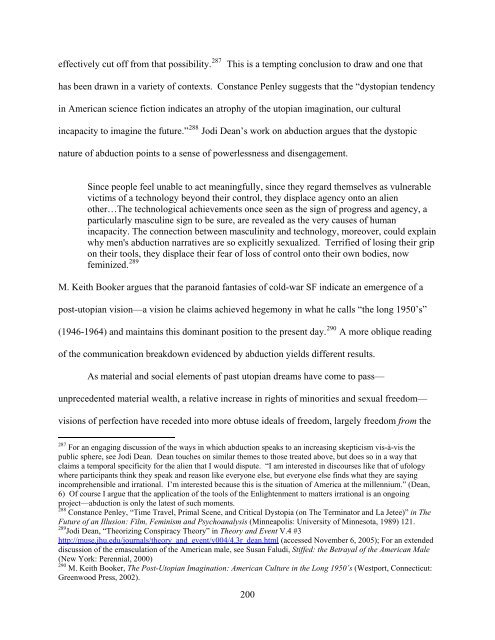A Genealogy of the Extraterrestrial in American Culture
A Genealogy of the Extraterrestrial in American Culture
A Genealogy of the Extraterrestrial in American Culture
You also want an ePaper? Increase the reach of your titles
YUMPU automatically turns print PDFs into web optimized ePapers that Google loves.
effectively cut <strong>of</strong>f from that possibility. 287<br />
This is a tempt<strong>in</strong>g conclusion to draw and one that<br />
has been drawn <strong>in</strong> a variety <strong>of</strong> contexts. Constance Penley suggests that <strong>the</strong> “dystopian tendency<br />
<strong>in</strong> <strong>American</strong> science fiction <strong>in</strong>dicates an atrophy <strong>of</strong> <strong>the</strong> utopian imag<strong>in</strong>ation, our cultural<br />
<strong>in</strong>capacity to imag<strong>in</strong>e <strong>the</strong> future.” 288 Jodi Dean’s work on abduction argues that <strong>the</strong> dystopic<br />
nature <strong>of</strong> abduction po<strong>in</strong>ts to a sense <strong>of</strong> powerlessness and disengagement.<br />
S<strong>in</strong>ce people feel unable to act mean<strong>in</strong>gfully, s<strong>in</strong>ce <strong>the</strong>y regard <strong>the</strong>mselves as vulnerable<br />
victims <strong>of</strong> a technology beyond <strong>the</strong>ir control, <strong>the</strong>y displace agency onto an alien<br />
o<strong>the</strong>r…The technological achievements once seen as <strong>the</strong> sign <strong>of</strong> progress and agency, a<br />
particularly mascul<strong>in</strong>e sign to be sure, are revealed as <strong>the</strong> very causes <strong>of</strong> human<br />
<strong>in</strong>capacity. The connection between mascul<strong>in</strong>ity and technology, moreover, could expla<strong>in</strong><br />
why men's abduction narratives are so explicitly sexualized. Terrified <strong>of</strong> los<strong>in</strong>g <strong>the</strong>ir grip<br />
on <strong>the</strong>ir tools, <strong>the</strong>y displace <strong>the</strong>ir fear <strong>of</strong> loss <strong>of</strong> control onto <strong>the</strong>ir own bodies, now<br />
fem<strong>in</strong>ized. 289<br />
M. Keith Booker argues that <strong>the</strong> paranoid fantasies <strong>of</strong> cold-war SF <strong>in</strong>dicate an emergence <strong>of</strong> a<br />
post-utopian vision—a vision he claims achieved hegemony <strong>in</strong> what he calls “<strong>the</strong> long 1950’s”<br />
(1946-1964) and ma<strong>in</strong>ta<strong>in</strong>s this dom<strong>in</strong>ant position to <strong>the</strong> present day. 290 A more oblique read<strong>in</strong>g<br />
<strong>of</strong> <strong>the</strong> communication breakdown evidenced by abduction yields different results.<br />
As material and social elements <strong>of</strong> past utopian dreams have come to pass—<br />
unprecedented material wealth, a relative <strong>in</strong>crease <strong>in</strong> rights <strong>of</strong> m<strong>in</strong>orities and sexual freedom—<br />
visions <strong>of</strong> perfection have receded <strong>in</strong>to more obtuse ideals <strong>of</strong> freedom, largely freedom from <strong>the</strong><br />
287 For an engag<strong>in</strong>g discussion <strong>of</strong> <strong>the</strong> ways <strong>in</strong> which abduction speaks to an <strong>in</strong>creas<strong>in</strong>g skepticism vis-à-vis <strong>the</strong><br />
public sphere, see Jodi Dean. Dean touches on similar <strong>the</strong>mes to those treated above, but does so <strong>in</strong> a way that<br />
claims a temporal specificity for <strong>the</strong> alien that I would dispute. “I am <strong>in</strong>terested <strong>in</strong> discourses like that <strong>of</strong> ufology<br />
where participants th<strong>in</strong>k <strong>the</strong>y speak and reason like everyone else, but everyone else f<strong>in</strong>ds what <strong>the</strong>y are say<strong>in</strong>g<br />
<strong>in</strong>comprehensible and irrational. I’m <strong>in</strong>terested because this is <strong>the</strong> situation <strong>of</strong> America at <strong>the</strong> millennium.” (Dean,<br />
6) Of course I argue that <strong>the</strong> application <strong>of</strong> <strong>the</strong> tools <strong>of</strong> <strong>the</strong> Enlightenment to matters irrational is an ongo<strong>in</strong>g<br />
project—abduction is only <strong>the</strong> latest <strong>of</strong> such moments.<br />
288 Constance Penley, “Time Travel, Primal Scene, and Critical Dystopia (on The Term<strong>in</strong>ator and La Jetee)” <strong>in</strong> The<br />
Future <strong>of</strong> an Illusion: Film, Fem<strong>in</strong>ism and Psychoanalysis (M<strong>in</strong>neapolis: University <strong>of</strong> M<strong>in</strong>nesota, 1989) 121.<br />
289 Jodi Dean, “Theoriz<strong>in</strong>g Conspiracy Theory” <strong>in</strong> Theory and Event V.4 #3<br />
http://muse.jhu.edu/journals/<strong>the</strong>ory_and_event/v004/4.3r_dean.html (accessed November 6, 2005); For an extended<br />
discussion <strong>of</strong> <strong>the</strong> emasculation <strong>of</strong> <strong>the</strong> <strong>American</strong> male, see Susan Faludi, Stiffed: <strong>the</strong> Betrayal <strong>of</strong> <strong>the</strong> <strong>American</strong> Male<br />
(New York: Perennial, 2000)<br />
290 M. Keith Booker, The Post-Utopian Imag<strong>in</strong>ation: <strong>American</strong> <strong>Culture</strong> <strong>in</strong> <strong>the</strong> Long 1950’s (Westport, Connecticut:<br />
Greenwood Press, 2002).<br />
200















